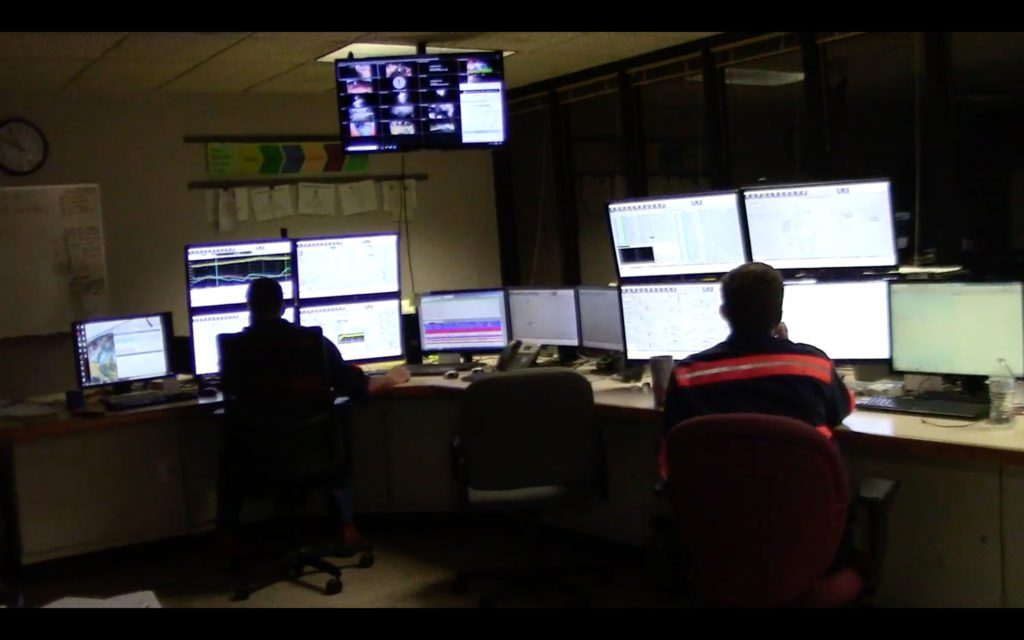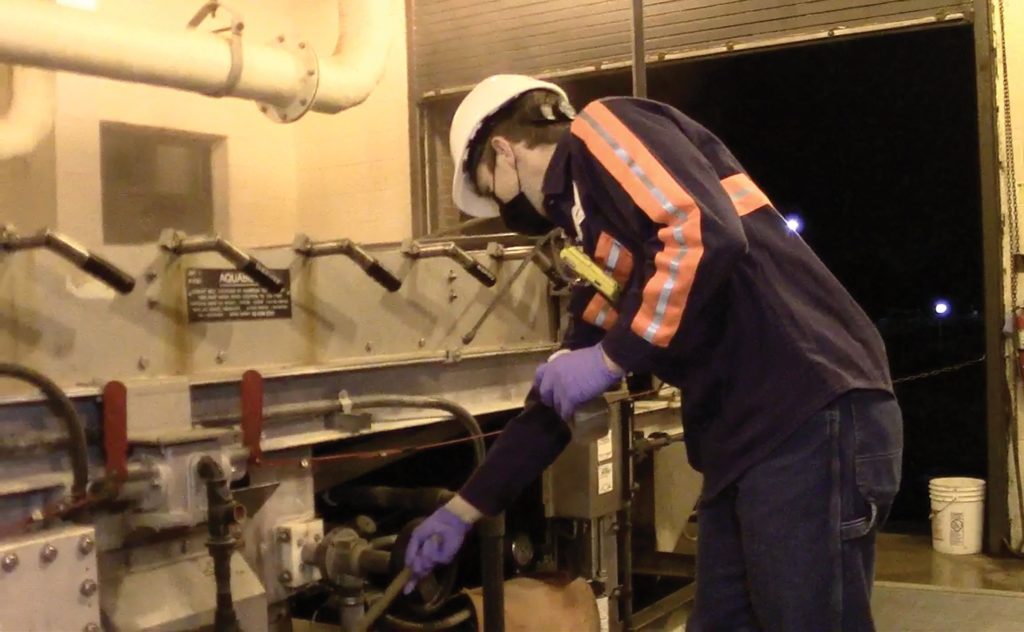Running a wastewater treatment plant requires constant vigilance and attention. And it certainly wouldn’t be possible without our staff of night operators. To get a sense of what it’s like to work at the plant overnight, communications and public affairs director Amanda Wegner spent a few hours with some of the team and documented her experience.
By Amanda Wegner
A full night ahead
At 9:30 p.m. on a rainy Tuesday night, I showed up in the control room to be greeted by two of our night operators on the team: Mitch Koller and Lucas Lee. The two were reading shift notes and getting caught up after being off a few days while other operators were already in position. Tonight, these two started their shift at 6:30 p.m.

“Shift notes are a big aspect of transferring information,” says Nathaniel Heiden, operator supervisor. “Not only communicating from shift to shift, but to document changes in a valuable way for the long term.”
“Each shift brings something new, so reading shift notes and knowing what happened during the shifts before yours is an important part of the job. We need that awareness,” said Mitch, who worked at the Monroe plant before coming to the District.
Of course, this is after an initial cup of coffee: “Working as the night operator requires a lot of coffee,” said Mitch.
With night operations, half of the team is responsible for plant operations and the other half is responsible for pumping stations, which they monitor via SCADA, the District’s operations monitoring system. This doesn’t keep them glued to their computers, however. Any operator responsible for pumping stations has on-plant duties during the night shift, including sample collection. The sample schedule varies each night, with some samples needing to be collected nightly, and some less frequently.
Sample collection
Sample collection happens in specific timeframes, based on when laboratory staff run the samples; they can’t sit too long, otherwise they become invalidated. In addition, most of the samples need to be returned to the lab cooler within 15 minutes, which requires quick work on behalf of the operators.

During the night, District operators collect a variety of different samples.
Operators take TWAS (Thickened Waste Activated Sludge) filtrate samples, samples from the acid digester, GBT (Gravity Belt Thickening) filtrate samples and GBT cake samples. All our operators move with ease among the different rooms and buildings, gathering all the samples needed before stashing them in the cooler.
Operators gather influent samples from our force mains. With each new sampling jug, it’s important to “stir it up” to ensure any settled materials get moved about and captured in the sample collection container. Knowing what solids are coming in is important for accurately billing our customer communities.
An additional step with the influent samples is acid preserving them in the lab. Acid preserving these samples helps “lock in” parameters that can’t be tested immediately; altering the pH stops certain reactions and “freezes” the sample so that certain biological reactions cease. In some ways, it is similar to placing a sample in the cooler, which slows or stops reactions so the lab has time to set up and run the tests.
When it’s time to grab struvite samples, it’s also an opportunity to bag the material; it’s a neat and efficient process that demonstrates the importance of the District’s resource recovery work. Through this elegant process of harvesting phosphorus from wastewater, we are reducing the amount of phosphorus in our biosolids and, in turn, our local waterways.
And, of course, the team samples the effluent.
Making rounds
While half of the operations team collects samples, the others do rounds at the plant. Night operators in charge of the plant have responsibilities that are similar to daytime operators, including responding to alarms, taking readings on the east and west blowers; taking generator readings; checking the thief holes (sampling wells to collect sludge in a digester); doing lisep (dewatering unit) cleanings; ensuring the influent screens are not plugged; and more.
“Operators are charged with running and operating the entire plant, where the rest of the workgroup offers support,” says Nathaniel. “Operators are responsible for monitoring equipment; maintaining equipment by cleaning, rotating and general inspections; sample collection; shift notes; and more.”
Sometime after midnight, I signed off at the plant, leaving the operations team to do their work. On this particular night, despite the heavy rains, things continued to be relatively smooth at the plant and pumping stations, which is precisely what operators, regardless of the shift, prefer.
“Dealing with the unexpected can be a change of pace, but status quo is better,” said Lucas.
What it takes to be a night operator
Being an operator requires a certain level of autonomy and problem-solving abilities.
“Plant operation can never stop, and our operators are entrusted with running the plant. They deal with a lot of situations. They need to make quick assessments and decisions on what is happening and initiate the first steps to address.”
Alan Grooms, operations manager
“There’s a lot of self-teaching, self-reliance in this role. You don’t want to be calling your supervisor for everything … if you do, you probably won’t last long,” says Lucas.
Adds Mitch: “In this job, you can’t always rely on someone else to make a call [on how to handle something]. You can’t just sit on your hands. You have to be comfortable in making decisions that affect the operation of the plant.”
If you’re curious what it’s like to be an operator at the District, check out our video “Day in the Life: Wastewater Treatment Operator” on our YouTube channel.






